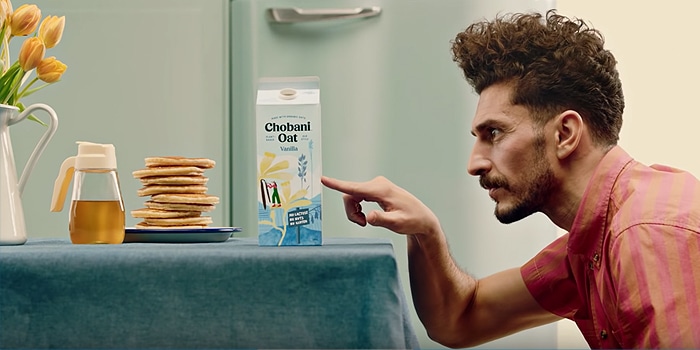Water Pouch Maker Notpla Eyes Expansion with New Funding
Backed by new funding, United Kingdom-based sustainable food and beverage packaging startup Notpla, maker of edible water pods, is focusing on expanding into other markets and applications, according to a profile in Fast Company last week.
Formerly known as OohoWater, the company rebranded to Notpla (short for not plastic) in July. The startup raised $1 million in a crowdfunding campaign last year and recently raised over $5 million in a “seed plus” round. The New York Times earlier this month listed Lupa Systems, the new investment firm of businessman and former 21st Century Fox CEO James Murdoch, as leader in the round. Notpla co-founder and co-CEO Pierre Paslier told NYT that bringing Murdoch on as an investor will help the company as it seeks to launch in the American market.
The company’s edible water pods were created in 2013 by Paslier and Notpla co-founder and co-CEO Rodrigo Garcia Gonzalez as students at Imperial College London and the Royal College of Art. They’re made by dipping a sphere of ice into calcium chloride and brown algae extract, which forms a membrane around the ice and holds the water in place when the ice melts. The tasteless seaweed coating formed around the water can either be eaten or composted.
“It’s a bit like a cherry tomato,” Paslier told Fast Company. “You put it in your cheek and bite on it. It explodes, so it’s quite a surprising experience.”
Notpla sachets were used at some water stations at last year’s London Marathon and will be used at a London half-marathon on March 1. The company also partnered with whiskey maker Glenlivet last October to create a “glassless cocktail.”
The company is looking to expand this technology to other avenues, including condiment packaging currently used by London-based food delivery service Just Eat. According to the outlet, Notpla is working on developing compostable takeout containers, and will also be partnering with Unilever.
Chobani Rolls Out “Almost Milk” Campaign
Yogurt maker Chobani unveiled its “Almost Milk” ad campaign this month in support of its new oat product line, AdAge reported. The brand first announced the line, which includes Oat Drinks and Oat Blend spoonable yogurt, in November.
Chobani is aiming to appeal to “flexitarians” interested in a dairy and plant-based diet, the company’s chief creative officer Leland Maschmeyer told the outlet.
“A lot of people who are into oat, or are ‘plant-based curious,’ are on the coasts of the country, and that’s where we’ve focused our media buys,” he said.
The Norman Rockwell-inspired “Almost Milk” campaign was created entirely in-house. It will be mostly comprised of out-of-home advertising, including 1,700 billboards and public transit displays across 27 markets including New York, San Francisco and Miami. It also includes video and audio placements on YouTube, Hulu, Pandora, NPR, Facebook and Instagram. The brand will also partner with coffee chains La Colombe and Maman for activations centered around its Barista Blend.
California Bill to Make Beverage Industry Responsible for Bottle Recycling Fails
A California bill requiring beverage distributors to create a bottle and can stewardship system to take back their containers failed last week after falling four votes short of clearing the state’s senate, according to the Associated Press.
Democratic Sen. Bob Wieckowski of Fremont, California released a statement following the bill’s defeat, calling it “a setback for consumers who are looking to us to transform a broken system that is crumbling before our eyes.” This marks the second time in two years that the proposal has failed. Wieckowski told the outlet the bill had the votes to pass the Senate this time around, but advocates of the bill said “intense lobbying” ultimately swayed opponents.
California is among 10 states that offer paid bottle redemption programs. The Beverage Container Recycling Act of 2020 would have required beverage makers to produce their own recycling programs by 2024, when it would then introduce liquor and wine bottles to the program. A similar program exists in Oregon, where the state’s redemption rates have since increased.
California Beer & Beverage Distributors President Victoria Horton told AP that this proposal was a “flawed concept” and that she favored a bill that would provide recycling solutions which would “be more inclusive of all affected parties.”
American Beverage Association spokesperson William Dermody claimed the organization did not lobby against the bill.
“Our industry is open to more effective solutions that recover more of our bottles so that they can be remade into new bottles,” he said.
After Soda Tax, Sweetened Beverage Sales in Seattle Drop
A new study found that months after Seattle adopted a tax on sugar-sweetened beverages last January, sales of these beverages in the city declined by 30.5%, The Seattle Times reported last week.
A peer reviewed study conducted by researchers at University of Illinois at Chicago compared store sales of these beverages to those in Portland, Oregon, where sales declined only 10.5%. The study looked at sales using Nielsen retail-scanner data from February to September 2018 across multiple channels and compared this to the same period in 2016 and 2017.
The tax of 1.75 cents per fluid ounce took effect in the city on January 1, 2018. It’s charged to distributors, who then pass it down to stores and subsequently to consumers who purchase the beverages. The tax’s supporters hoped it would lead to a decline in sugary beverage purchases, with the tax money funding health and education programs, while critics called it “regressive” and said it would disproportionately affect the city’s lower income residents.
According to AP, there is no indication that the tax continues to cause a decline in sales, and it was expected to raise $24 million in 2019. Jim Krieger, a University of Washington professor who heads the nonprofit Healthy Food America, told the outlet that a drop and subsequent stabilization of sales is consistent with other soda-taxed cities such as Philadelphia.

